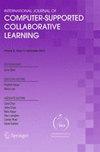Collaborative Tasks in Immersive Virtual Reality Increase Learning
IF 4.2
2区 教育学
Q1 EDUCATION & EDUCATIONAL RESEARCH
International Journal of Computer-Supported Collaborative Learning
Pub Date : 2023-10-03
DOI:10.22318/cscl2023.465996
引用次数: 1
Abstract
: Advances in immersive virtual reality (IVR) are creating more computer-supported collaborative learning environments, but there is little research explicating how collaboration in IVR impacts learning. We ran a quasi-experimental study with 80 participants targeting ocean literacy learning, varying the manner in which participants interacted in IVR to investigate how the design of collaborative IVR experiences influences learning. Results are discussed through the lens of collaborative cognitive learning theory. Participants that collaborated to actively build a new environment in IVR scored higher for learning than participants who only watched an instructional guide’s avatar, or participants who watched the guide’s avatar and subsequently discussed what they learned while in IVR. Moreover, feeling negative emotions, feeling active in the environment, and feeling bonded to the group members negatively correlated with learning. Results shed light on the mechanisms behind how collaborative tasks in IVR can support learning.沉浸式虚拟现实中的协作任务促进学习
本文章由计算机程序翻译,如有差异,请以英文原文为准。
求助全文
约1分钟内获得全文
求助全文
来源期刊
CiteScore
8.00
自引率
18.60%
发文量
20
期刊介绍:
An official publication of the International Society of the Learning Sciences, the International Journal of Computer-Supported Collaborative Learning (IJCSCL) fosters a deep understanding of the nature, theory, and practice of computer-supported collaborative learning (CSCL). The journal serves as a forum for experts from such disciplines as education, computer science, information technology, psychology, communications, linguistics, anthropology, sociology, and business. Articles investigate how to design the technological settings for collaboration and how people learn in the context of collaborative activity.

 求助内容:
求助内容: 应助结果提醒方式:
应助结果提醒方式:


